Douglas Rissing/iStock via Getty Images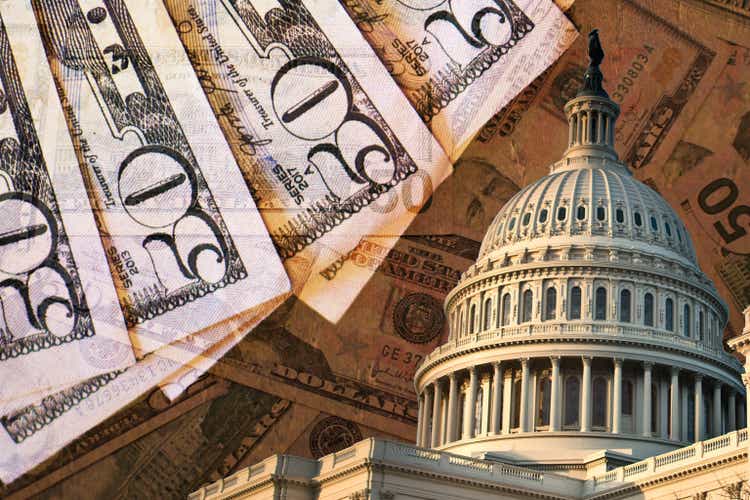
Most news headlines concerning insider trading usually portray the activity in a negative light and ultimately lead to allegations suggesting some sort of fraud or other ill-doing. That being said, with respect to this article the act of insider trading is nothing more than an individual committing to purchasing or selling securities of the company at which they are an insider, and most of the trading done this way is, in itself, perfectly legal.
Who is considered an insider? Federal law defines an insider as a company’s officers, directors, or someone in control of at least 10% of a company’s equity securities. Company employees with significant access to privileged information report their trades to the Securities and Exchange Commission by filing S-4 forms in a timely manner. In fact, we believe that insiders supply the market with high-quality investment information every time they decide to trade their own company’s shares in the open market. An investor that is better informed than their competition can generate higher returns, and in the end, the one who possesses the ultimate level of corporate-specific knowledge is none other than the corporate insider themself.
So the objective shifts towards identifying if investors can use corporate management’s legal insider trading in order to form a profitable investment strategy and attempt to deliver alpha over the overall market. Many books and academic works have been dedicated to this subject. One of the more popular ones being “Investment Intelligence from Insider Trading” by Nejat Seyhun, who is a Professor of Business Administration at the University of Michigan. Another comprehensive guide to the subject is “Profit from Legal Insider Trading” by Jonathan Moreland. There is also a study titled “Estimating the Returns to Insider Trading” published by Leslie A. Jeng and Richard Zeckhauser of Harvard. All of them share the basic idea that the people who have the most knowledge of the inner workings and future prospects of a company know best when and at what price to buy.
What corporate insiders were buying
This is exactly the basis of today’s article. We analyzed thousands of S-4 fillings to find companies that have experienced periods of unusually concentrated purchasing activity by their corporate insiders. We have attempted to place emphasis on companies that enjoyed buying across the board from multiple insiders, in quantities that were not recorded previously, often after a period of selloffs.
Today, we’ll discuss mid-cap stocks only, but we have plans to follow up this series with additional articles covering both small-cap and large-cap data in a similar manner. For the purposes of this analysis, we defined mid-cap as having a market capitalization between $2 to $10 billion. This is our short list of research-worthy mid-cap companies that in our view enjoyed a period of unusual and atypical interest from corporate insiders during the second quarter:
Clearwater Analytics (CWAN)
-
Active Corporate Insiders: 7
-
YTD Performance: -24.5%
- Total Bought Back: $10,025,708
Clearwater Analytics is an interesting company that is in the business of providing “Software as Service” or SaS solutions in the field of automated investment data aggregation, reconciliation, accounting, and reporting. The company’s customers typically include insurers, investment managers, corporations, institutional investors, and government entities. The pullback the company has experienced has been nothing remotely close to the others, as Clearwater only slightly underperformed the S&P 500 year-to-date. However, it is worth pointing out the company has lost almost 35% of its market value since the IPO. With the company only going public in September of last year, it is the heavy across-the-board insider interest that sets this company apart. Even after the selloff, with a FWD EV/EBITDA of 32.10x and FWD P/FCF of 66.03x, the company is still selling at a significant premium. Clearwater enjoyed extreme interest during the second quarter from corporate insiders including the CEO, Sahai Sandeep, the CTO Das Souvik, and four other corporate officers, as well as the investment advisor firm Durable Capital Partners which owns a stake larger than 10% in the company. Corporate insiders bought back a total of $10.02 million during the second quarter at an average estimated price of $13.06. The company currently trades at $16.35 per share.
Clearwater Analytics and S&P500 1-Year Return (Seeking Alpha)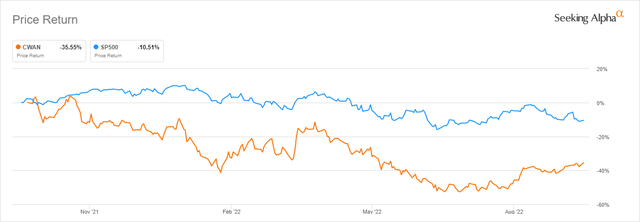
AbCellera Biologics (ABCL)
-
Active Corporate Insiders: 3
-
YTD Performance: -49.5%
- Total Bought Back: $13,957,134
AbCellera Biologics is a Vancouver-based, biotechnology company that is in the business of researching and developing human antibodies. The company generates revenues from multiple sources including research fees, licensing, optional investment shares, milestone payments, and the largest amount through royalties from successful drugs to market. The patented technology, software, and processes that they use are extremely efficient in operating expenses, allowing a long runway before needing any capital. These efficiencies have helped AbCellera Biologics maintain nearly 74% of gross margins and 39.5% net profit margins. The company has a market capitalization of $2.97 billion and an enterprise value of $1.98 billion, signaling a strong liquidity position, with slightly more than $1 billion in cash on the books. On top of that, AbCellera reported only $380.92 million in total liabilities in its latest earnings report. After being beaten down so far this year, shares of AbCellera Biologics have been picked up by the CFO Andrew Booth and the COO Lecault Veronique, as well as Thermopylae Holdings Ltd, which holds a larger than 10% position within the company. Insiders bought back a total of $13.95 million during the second quarter at an average estimated price of $6.88. The company is currently trading at $10.42 per share, having already gained 51.45% on the average priced paid by the insiders.
ABCL and S&P500 1-Year Returns (Seeking Alpha)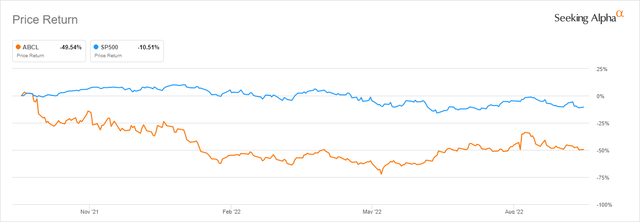
Ares Capital Corp (ARCC)
-
Active Corporate Insiders: 3
-
YTD Performance: -11.2%
- Total Bought Back: $6,381,371
Ares Capital is the only BDC on the list and is also the world’s largest with a market capitalization close to $9.5 billion. Business Development Companies, also known as BDCs, are entities that are in nature similar to REITs, but much less popular. While REITs allow the individual investor to be able to deploy capital towards real estate more efficiently, BDCs function in a similar way and offer investors an investment vehicle into equity or debt of small to medium-sized financially distressed companies. BDCs allow these relatively smaller companies access to capital they would struggle to find elsewhere, in addition to offering mentorship with the end-goal of ultimately growing the company. In order for a company to qualify as a BDC, it is required to deploy at least 70% of assets into private or public U.S. companies with market caps under $250 million. Again, similar to REITs, it can avoid paying corporate taxes as long as it distributes at least 90% of its income to shareholders via dividends. This allows the company to offer a 9.07% dividend yield for investors willing to take the risk associated with such an investment. Shares of Ares have been bought by EVP Michael Arougheti, Co-President Michael Lewis Smith, and Director Steven McKeever. Insiders bought back a total of $1.83 million during the second quarter at an average estimated price of $22.63. The company is currently trading at $18.97 per share.
Ares Capital and S&P500 1-Year Return (Seeking Alpha)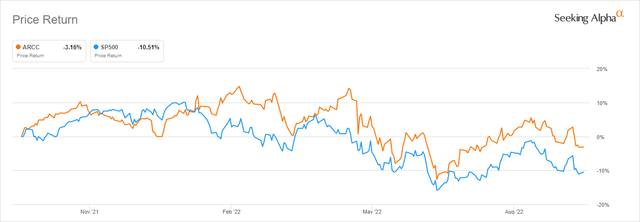
Carvana (CVNA)
-
Active Corporate Insiders: 6
-
YTD Performance: -89.8%
- Total Bought Back: $615,514,665
Carvana operates an e-commerce platform for buying and selling used cars in the United States. The company was founded in 2012 and is recognized as one of the fastest-growing online used car dealers in the United States and became well known for its multi-story car vending machines. Since its IPO in 2017, it has been one of the great success stories of the last bull market, even managing to briefly become a 30-bagger stock for its early investors during the third quarter of 2021 when the stock shortly traded for over $370 a share. However, changing sentiments in the market combined with a significant slowdown in growth resulted in a monumental decline for the stock. The pessimism surrounding its future prospects saw a build-up of a 31.11% short position in the company. Many see the business model as unsustainable and the company on a clear path to imminent bankruptcy but that has not stopped insiders from buying hands over fists since the decline in the stock price. Shares in the online car retailer have been bought by Vice-President Paul Breaux, Co-founder Ryan Keeton, CPO Daniel Gill, and both Ernest Garcia II and Ernest Garcia III. They bought back a total of $615.51 million during the second quarter at an average estimated price of $30.86. The company is currently trading at $32.43 per share.
Carvana and S&P500 1-Year Returns (Seeking Alpha)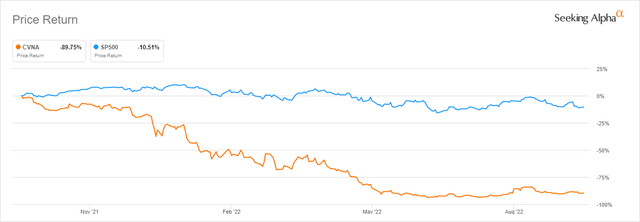
Macerich Co (MAC)
-
Active Corporate Insiders: 2
-
YTD Performance: -46.8%
- Total Bought Back: $1,173,610
Macerich is a Real Estate Investment Trust operating in the mall space that after cutting its dividend multiple times and heavily diluting its shareholders in order to stay afloat, barely made it through the pandemic. After the initial post-pandemic recovery, shares of the company have experienced another significant selloff, underperforming the market by about 30% year-to-date. Having always been pushed to the side by its vastly more popular peer, Simon Property Group (SPG), Macerich is showing the potential of becoming a contrarian underdog turnaround story. The REIT is forced to endure all the same headwinds with an arguably worse balance sheet and much more shaken shareholder confidence. Still, the pure value proposition is somewhat hard to argue with. The REIT is selling at 4.66x FWD P/FFO and offering a 6.65% dividend yield. in Q2 Shares of the REIT were bought by president Edward Coppola and CEO Thomas O’Hern. They bought back a total of $1.17 million during the quarter at an average estimated price of $9.50. The REIT is currently trading at $9.03 per share.
Macerich and S&P500 1-Year Return (Seeking Alpha)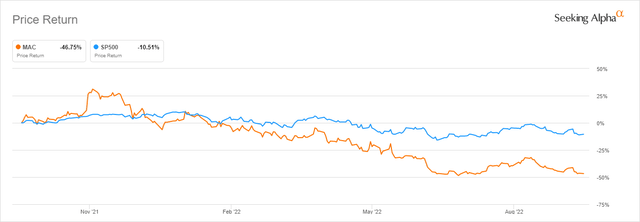
Final thoughts and conclusions
Many guides for fundamental analysis of companies suggest that reviewing corporate insiders’ sentiment remains an extraordinary resource at the disposal of the individual investor. However, not only can investors rely on insider trading data as a resource to add on top of their due diligence, they also have the ability to utilize insider data as a starting point for research into investment opportunities through backtesting and other analysis. We stand firm by the belief that investors should utilize alternative data during their investment process.


Be the first to comment